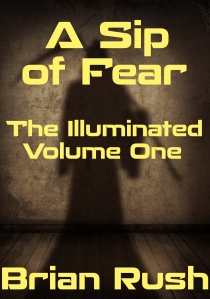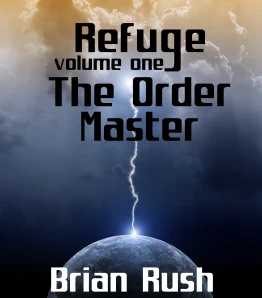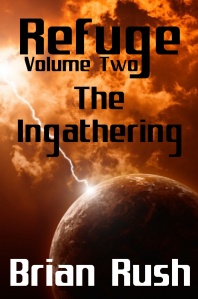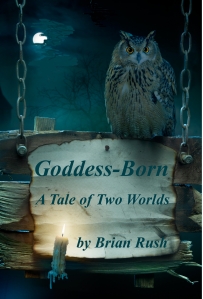 Imagine this. You are sitting at home one evening by yourself, reading or watching television or doing whatever passes the time, when a fairy pops into being and offers you a chance to change the world. She is dressed in a long robe that covers her whole body and stands the height of a mortal woman. A hood obscures her face except for her eyes, exceptionally bright and a vivid shade of green, and the tip of her long nose. You see no wings nor any aura of magic or trail of fairy-dust, and you know that she is a fairy only by the way your eyes open wide and your breath comes in fearful gasps and your heart pounds, and of course by the fact that she appeared suddenly from thin air.
Imagine this. You are sitting at home one evening by yourself, reading or watching television or doing whatever passes the time, when a fairy pops into being and offers you a chance to change the world. She is dressed in a long robe that covers her whole body and stands the height of a mortal woman. A hood obscures her face except for her eyes, exceptionally bright and a vivid shade of green, and the tip of her long nose. You see no wings nor any aura of magic or trail of fairy-dust, and you know that she is a fairy only by the way your eyes open wide and your breath comes in fearful gasps and your heart pounds, and of course by the fact that she appeared suddenly from thin air.
The fairy carries a ball about the size of a tennis ball that glows with pale blue light. You reach out to touch it, entranced, but the fairy draws it back out of reach. “Ah, not yet!” she says. “If you touch this orb, you will change the world. I must tell you the nature of the change before you make that decision.”
“That’s – that’s nice of you,” you say around gulps.
The fairy shrugs. “Informed consent,” she says. “There are rules about these things. Anyway, if a mortal lays hand on the orb and wills it, the world will be infused with magic and many things now impossible will become possible.”
“Such as a fairy materializing in my living room,” you say.
“Precisely, and that is normally impossible.”
“So how did you manage it?”
“I got a special dispensation. You wouldn’t be able to make this choice otherwise. If you say no, the world will continue as it is, with little magic in it except the subtle kind and sorcerers (the real ones) operating under the radar. If you say yes, while grasping the orb, all of that changes.
“Some mortals, perhaps one in a thousand, have the aptitude to become great magicians. They will develop mighty powers, those of them that survive anyway. Magic is dangerous and will become more so if you choose to set it free. But those who survive to master the Art will have great powers to shape the course of fate, to sense and manipulate the minds of others, to bend time and space to their will, to heal the afflicted and afflict the healthy, to make powerful blessings and curses.”
“Will I be one of these people?” you ask.
“Sorry,” the fairy says. “I’m not required to tell you that. You must make the choice not knowing if the powers of magic will be yours to command.”
“Oh.”
“And that’s only the beginning. If you touch the orb and make it so, the worlds of faerie and the mortal world will touch one another more closely. My kind will appear frequently to offer wonders and terrors, to beguile the hearts and minds of men and women, to trade in blood, to be bound by cold iron. Marvelous beasts and creatures of myth and legend will roam the wilderness and the streets. The Sphinx may return to ask her deadly riddles. Dragons will soar above the mountaintops, cruel and wise, benevolent and deadly. Great warriors will arise to do battle with monsters, heroes such as are never born today, and fairy children and the offspring of the gods will walk among mankind.”
“What about the dead?” you ask. “Will we see ghosts, vampires, zombies, those returned from the grave?”
“Of course!” says the fairy. “It’s all part of the package.”
“How about technology? Will that still work for us?”
“More or less. The rules of physics won’t be repealed, but they already ride the waves of probability. With powerful magic flowing through the world, the improbable will become commonplace and technology will become somewhat unreliable. It will still work when it works.”
“I don’t know,” you say. “It sounds like a dangerous world.”
“Oh, that it is,” the fairy says, “but the world is dangerous already. You are protected in the swaddling of civilization for the moment, but just over the horizon of tomorrow are dangers that will freeze your blood. Storms and famine and drought and flood come and the fabric of life itself is unraveled. Safety is an illusion. You will live to see what I mean, and your children (if you have any) will see more of it.”
“Only one person in a thousand can be a magician, you said?”
“That might be a liberal estimate,” the fairy says. “Perhaps that many, perhaps as few as one in ten thousand, will be able to wield the power in a great and artistic fashion. Of course, everyone will have their little spells.”
“Sounds like a world in which the powerful could dominate the rest of the people,” you say.
“Again,” the fairy says, “how is that different from the world as it is now? Don’t the powerful whistle the tune now and make the world’s governments and the world’s people dance to their will? Is money any less elitist than magic as a source of power? The wealthy and greedy will be replaced as ruling class by the sorcerous and enlightened. Will that be better than what you have now, or worse, or neither? That’s for you to decide.”
“We could find ourselves under the heel of Sauron or Emperor Palpatine or Lord Voldemort!”
“Yes. Of course, millions of people in the past century have found themselves under the heels of Hitler and Stalin and similar tyrants. Would they have been more dangerous with magic? Perhaps, but it’s difficult to see how, isn’t it? Magic might have been their undoing. Their enemies of good heart might have stopped them before their crimes could be committed.” The fairy holds the orb out to you. “Enough. You have been informed of the choice and of the consequences for the world, if not for yourself – that must remain a gamble and a choice of faith. Make your decision, mortal. Change the world or leave it unchanged. Touch the orb and will a new world to be, or bid me go.”
What would your choice be?
Image credit: subbotina / 123RF Stock Photo
 Realmgolds by Mike Reeves-McMillan is an other-world fantasy with original and unusual world-building. The title of the book comes from the title in the fictional culture for a head of state. A “gold” is a member of the wealthy elite (the society also has “silvers” and “coppers,” meaning exactly what one would expect), and some golds are government officials at various levels (Localgolds, Countygolds, etc. on up to the Realmgold). The society also includes an admixture of human and quasi-human persons: dwarves, gnomes, centaurs, and beastheads. The official policy is equality and tolerance, but a “human purity” movement exists that rejects the rights and equality of quasi-humans. The movement is associated with a rebellion against the existing authority in the nation of the main character, Determined, of which he is the Realmgold.
Realmgolds by Mike Reeves-McMillan is an other-world fantasy with original and unusual world-building. The title of the book comes from the title in the fictional culture for a head of state. A “gold” is a member of the wealthy elite (the society also has “silvers” and “coppers,” meaning exactly what one would expect), and some golds are government officials at various levels (Localgolds, Countygolds, etc. on up to the Realmgold). The society also includes an admixture of human and quasi-human persons: dwarves, gnomes, centaurs, and beastheads. The official policy is equality and tolerance, but a “human purity” movement exists that rejects the rights and equality of quasi-humans. The movement is associated with a rebellion against the existing authority in the nation of the main character, Determined, of which he is the Realmgold.








